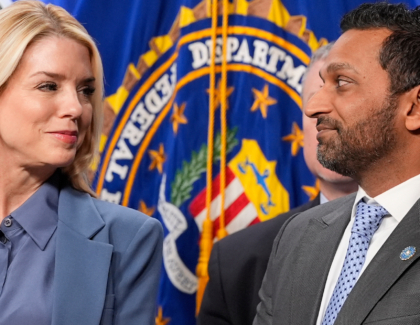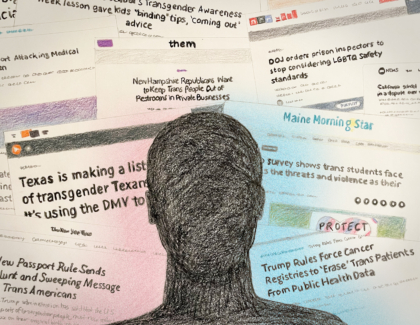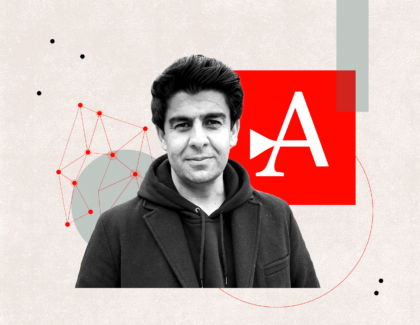Sign up for the daily CJR newsletter.
Tuesday, three Norwegian journalists from public TV broadcaster NRK said they were stopped at an improvised checkpoint as they were leaving occupied Crimea on their way to Ukraine. Guards confiscated three laptops containing all the material the team had filmed, along with memory sticks, a small camera, bulletproof vests, and helmets.
“The mood was extremely aggressive,” one of the journalists, Jan Espen Kruse, told NRK’s website. “They stood there with their masks and loaded weapons and accused us of being spies.”
The Norwegian team was lucky. They were detained for only about 45 minutes. As the standoff between Russia and the fledgling government of Ukraine deepens, harassment and intimidation of journalists–both foreign and Ukrainian–have become commonplace, seriously undermining independent reporting from the crisis zone, not to mention making life perilous for the journalists themselves.
On Sunday, three Ukrainian journalists–Kateryna Butko, Alexandra Ryazantseva, and Olena Maksymenko–were held by the pro-Russian party “Russian Unity” for three days before being released miles away in the port city of Sevastopol. American reporter Simon Ostrovsky and British videographer Frederick Paxton posted Tuesday on YouTube a dramatic incident on the Kherson border where they, too, claimed to have been roughed up by pro-Russian forces.
“What we are seeing in Crimea is a dismantling of media freedom,” said Dunja Mijatovic, representative for Freedom of the Media at the Organization for Security and Cooperation in Europe, in an email interview. “It is disconcerting.”
Journalists trying to report in Crimea and the eastern part of Ukraine are harassed, intimidated, and physically attacked on a daily basis. Media outlets are being shut down. Internet news sites are subjected to cyber attacks that hinder their work.
“It’s getting more intense and less safe,” said Christopher J. Miller, an editor at Kyiv Post, in a telephone interview Sunday, just after he had just returned from Crimea. Pro-Russian forces aimed guns at him as he tried to report, he said.
The transmission of four TV stations–Channel 5, 1+1, Inter, and Chernomorskaya Teleradiokompaniya (Black Sea TV)–has been blocked, replaced with signals from Russian counterparts. Now Crimean citizens, 69 percent of whom get their news from television, can only watch stations like Russia-24, produced by the All-Russian State Television and Radio Broadcasting Company.
Last week, masked men in unmarked army gear forced their way into the Crimean Center for Investigative Journalism and smashed equipment, including the group’s server. The group was only able to recover its archives with technical help from the San Francisco-based Global Investigative Journalism Network. Journalists for the Crimean Center, working from their homes, continue to report. On one page of their site, updated daily, they document alleged bullying of journalists and opponents of the Russian occupation.
The bullying extends online as well. Russia’s telecom supervisory board, Roskomnadzor, today Wednesday warned Lenta.ru, one of the most popular Moscow-based news websites, for posting “extremist materials” when it ran an interview with Dmytro Yarosh.
Yarosh, who made his name earlier this year throwing firebombs at Ukrainian police, is now deputy director of Ukraine’s security council in the new interim government. The leader of the far right party is also running for president in Ukraine, although he is not expected to poll well.
On March 10, Lenta.ru reported that YouTube had been blocked from Crimea and parts of Russia due, again, to the posting of “extremist material.” Many of the videos appear to be examples of pro-Russian groups in Crimea roughing up journalists and activists. Later in the day the agency said the social media site was working again, albeit sporadically.
“Members of the media are working under almost impossible conditions in Crimea,” whereas the situation in the rest of Ukraine is better,” Mijatovic said.
Better is relative. Mijatovic’s office counted nearly 200 journalists, photographers, videographers, and drivers who were brutally beaten, mainly by law enforcement officers, during the protests at Maidan Square in Kiev earlier this year, under the last government. One journalist, Vyacheslav Veremyi from the newspaper Vesti, was murdered.
While post-Soviet Ukraine was never a bastion of press freedom and media independence, conditions for the media worsened when the recently ousted Viktor Yanukovych came to power in 2010, according to Freedom House, a US-based NGO that monitors human rights.
Business magnates with varying political interests own and influence most major outlets, limiting the availability of unbiased professional news outlets. Further, Freedom House said, the state exercises politicized control over national and regional broadcasting.
Pressure on independent voices increased dramatically last year, Freedom House said, after a crony of Yanukovych purchased TVi, one of the last independent stations. As a result, 30 of its top journalists resigned.
Whether the interim government is willing or able to do a better job is still up in the air. Mijatovic, who met with senior administration officials in Kiev and Crimea, said the Organization for Security and Cooperation in Europe is looking to start projects that can rapidly strengthen independent reporting in Ukraine. First on the agenda is providing for journalists’ safety: Her office hopes to train reporters and photographers to report in conflict zones.
What helps, she added, is that Ukraine has an active civil society that supports journalists, and so far independent media have shown signs of being able to work around problems. The blocked TV stations are now streaming from the internet. The Crimea Center for Investigative Journalism is back reporting. Websites, Facebook pages, and YouTube videos ensure that a broad array of viewpoints are at least available, if not widely seen.
Still, a fully functioning, strong, and independent press in Ukraine remains a distant goal.
“There are good signs coming from the interim authorities, but much more needs to be done in order to return to an environment of trust and ensure that journalists can work freely,” Mijatovic said.
Has America ever needed a media defender more than now? Help us by joining CJR today.






